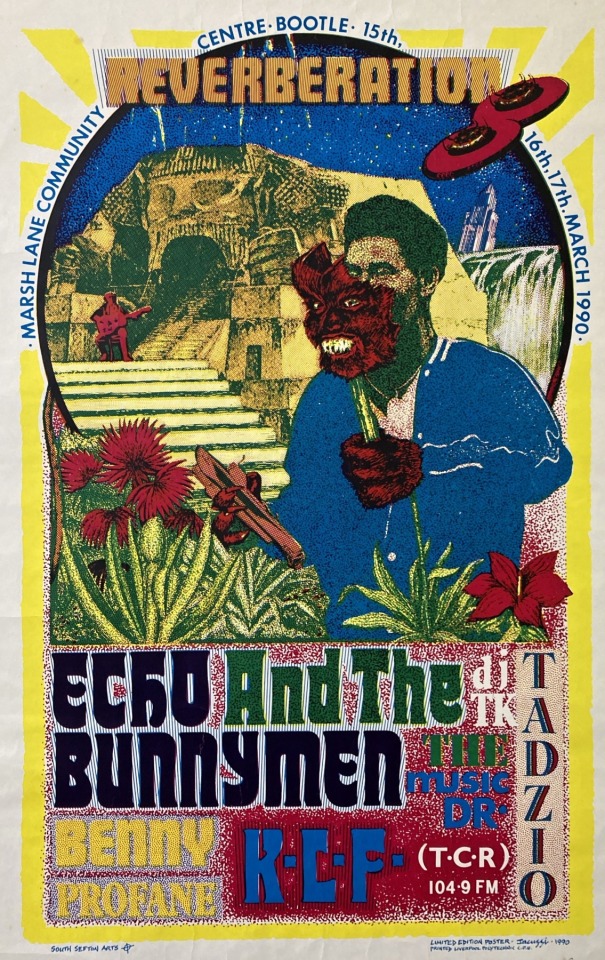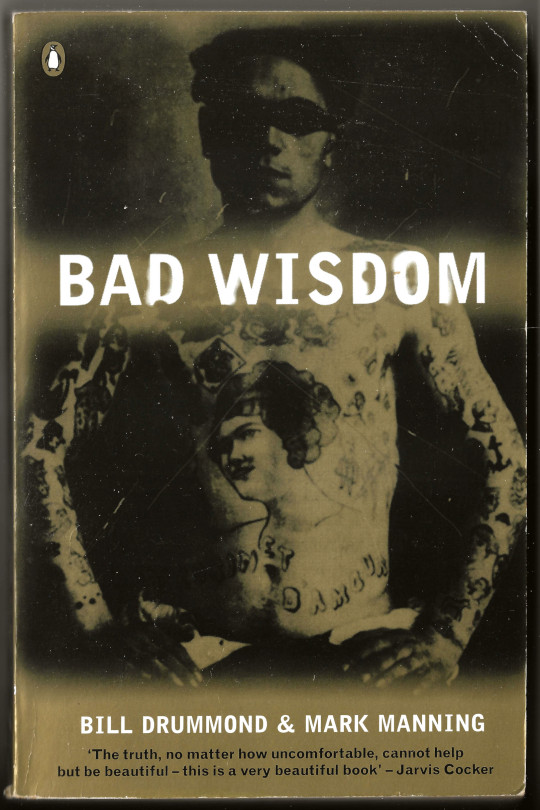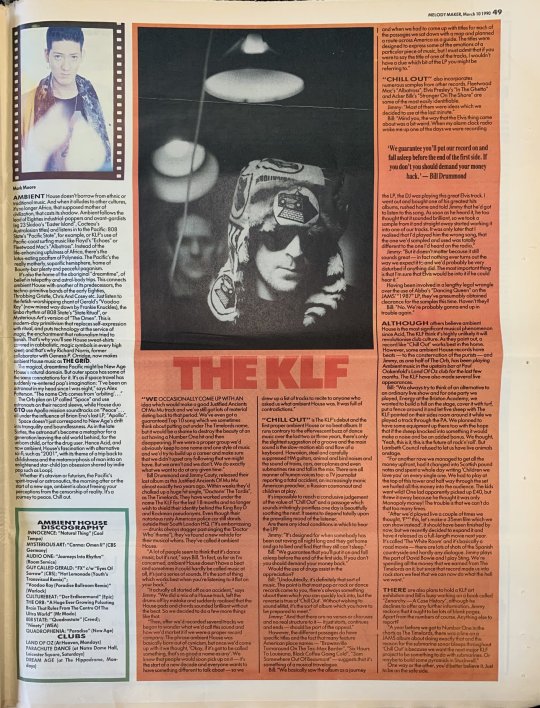#KLF
Text
youtube
The KLF: Beyond The Band That Burnt £1,000,000 I New British Canon
If you’ve heard of the KLF, you probably know them as a band that burnt a million pounds. But that is only the conclusion to their story. The journey that led them to the Isle of Jura on that fateful August morning in 1994 is even more fascinating.
A journey that includes getting sued by ABBA, gaining a number one single in the guise of a talking car, pioneering at least one genre of dance music and becoming one of the most successful singles bands of the early 90s. They were two men compelled by the forces of chaos to spread as much confusion as possible and they transformed that into a pop career. This is New British Canon and this is the Story of The KLF.
#klf#dance music#electronic music#rave#ambient#1990s#1990's#90s#90's#music production#documentry#bill drummond#jimmy cauty#Youtube
43 notes
·
View notes
Text

Echo and the Bunnymen, 1990.
5 notes
·
View notes
Text
youtube
3 notes
·
View notes
Photo


On 5th November 1995, Bill Drummond and Jimmy Cauty, as the K Foundation, painting a contract onto a Nissan Bluebird car, agreeing to end the K Foundation and to stop talking about their film, “Watch the K Foundation Burn a Million Pounds”, for 23 years. The car was then pushed off a cliff.
#the klf#klf#bill drummond#jimmy cauty#the k foundation#k foundation#conceptual art#nissan bluebird#Watch the K Foundation Burn a Million Pounds#1995
145 notes
·
View notes
Text

Orbital impact. ⭕️🇬🇧🎶🟧🟩
#orbital#klf#the prodigy#chemical brothers#fatboy slim#big beat#break beats#drum and bass#house music#electro house#electro music#progressive house#progressive trance#trance music#acid house#coachella#coachella 2024#edm music#webster hall#dance music#electronic music#electronica#turntable#daft punk#the orb#david holmes#unkle#rave#ravers#edc las vegas
3 notes
·
View notes
Text
"Be ready to ride the big dipper of the mixed metaphor. Be ready to dip your hands in the lucky bag of life, gather the storm clouds of fantasy and anoint your own genius."
4 notes
·
View notes
Text

Bad Wisdom by Bill Drummond and Mark Manning with a cover taken from Skin Deep, a tattoo album by Christopher Gotch and Ronald Scutt.
3 notes
·
View notes
Photo


Ambient House! Paul Oldfield investigates! / The KLF meet Push. Melody Maker, 10 March 1990
92 notes
·
View notes
Text
#The KLF#KLF#Tammy Wynette#Justified and Ancient#justified#ancient#music videos#music vibes#music visualization#music vlog#music video#captainpirateface#bipolardepression#chemicalimbalance#wtf#electronic music#electronic#wax trax records#wax trax#sights and sounds of tumblr#beautiful sights#sights and sounds#we have such sights to show you#captain pirateface#CaptainPirateFaceLovesYou#Spotify
12 notes
·
View notes
Text
Who Killed the KLF?

Who Killed the KLF? [trailer]
Documentary that explores the rise and fall of the KLF in the 1980s and 1990s, touching upon themes that perfectly capture the 21st century zeitgeist. A tale as intriguing as it is bonkers.
I knew the songs, but only when I read an extensive article a few years ago I learned about the history of Jimi Cauty and Bill Drummond, the two people behind KLF.
It's really a hard to believe, unique, brilliant and bonkers story. And hugely entertaining.
18 notes
·
View notes
Photo

K Foundation advertisement, published in the NME, 14 August 1993
#k foundation#klf#klf communications#The Justified Ancients Of Mu Mu#Bill Drummond#Jimmy Cauty#print advertising#nme#1993
8 notes
·
View notes
Text
youtube
THE KLF - The Rites of Mu
KLF are back, yet they never went away. Fall down the rabbit hole & find the KLFRS... ssshhhhhh... or ssshhhhhhout it out... or ssshhhhhhare it, there are no rules, it's art if you say it's art. These guys opened my mind as a teenager, they planted the seed which lead me to walk the path searching for Mu Mu land. They're back just when we needed them the most.
Thank you KLF. You are justified. You are ancient. You drive an ice cream van.
Love Martyn xxx xxx xxx xxx xxx xxx xxx xx
#THE KLF - The Rites of Mu#The KLF#KLF#jimmy cauty#klf communications#KLFRS#Justified Ancients of Mu Mu#the JAMs#the Timelords#Bill Drummond#23#Youtube
2 notes
·
View notes
Text
Postmodern Moralists
Apropos of writing my first book review in ages (for next month's WIRE), I got nostalgic for the time when I did quite a few for the sadly missed The Word, the magazine. Here's one from 2012.


100
Bill Drummond
Penkiln Burn
I Must Not Think Bad Thoughts: Drive-by Essays on American Dread, American Dreams
Mark Dery
University of Minnesota Press
Subversive thinkers rampage through 21st century life, perturb deeply.
In 1975 the 22-year-old Bill Drummond, then a set-builder in a Liverpool theatre, spent an evening working with Ralph Steadman on set designs and listening eagerly to his Hunter S Thompson anecdotes. One in particular stuck with him – a story of Thompson and Steadman undercover of night painting “FUCK THE POPE” in gigantic letters on a ship, which then sailed down the Hudson river behind the Pope and mayor of New York live on primetime TV. Spectacularly crass, and – it transpires – almost certainly untrue, but the scale of the supposed prank clearly had a powerful and lasting influence on the man who would machine gun the Brit awards and take Tammy Wynette to the top of the charts in an ice cream van.
In 100, Drummond answers 100 questions about his life and work from 25 interlocutors in language so sternly understated it would – if he weren't so reluctant to self-identify as a “Scottish artist” – be tempting to describe it as Presbyterian. He looks back over Quixotic missions and arrogant mischief – from looking deep into the heart of Haiti to trying to hunting Abba – always with a cool eye, puncturing his own pretensions and admitting his inconsistencies. Clearly, though, the love of provocation and blunt urge to tip up tables is still there as powerfully as it was in that impressionable youth or in the KLF years.
His subject matter is often prosaic, with an underlying rejection of the modern: recurring motifs include woodworking tools, white emulsion, Creedence Clearwater Revival, untrained people singing together. But he uses and clearly understands technology, and his meditations on downloading and copyright, and on how Goebbels would have used the internet, provide as much to get your teeth into as those by any zippy young tech guru. Drummond mistrusts almost everything – language, culture, the art establishment, recorded music, his own ideas – but his desire to tug at each thought or assumption, to test its strength, leads him into the most glorious trouble, and to ask questions that very sorely need asking.
Mark Dery is another outsider thinker, but one with a furiously different approach to Drummond's deadpan, sidelong observations. A punk by inclination, an academic by trade, he runs headlong into every topic, picking fights, firing off linguistic zingers in all directions, creating a vivid vision of 21st century life. In his world, the blogosphere is “this dictatorship of the commentariat... this grotesque hypertrophy of the chattering class”, his own stepfather is “Conan the Vulgarian” and his favourite Queen song (“The Fairy Feller's Master-Stroke” since you ask) features “laser-sharp harmonies by robo-seraphim, heavy-breathing, glam-metal harpsichord that sounds like Scarlatti shtupping Liberace... and to top things off, a gong.”
Looking at the image of the undead in pop culture, he races from contextualising Marx's vampiric capitalists within the Victorian Gothic to holding a magnifying glass to US survivalists' addiction to the zombie apocalypse trope. He outs HAL9000 in 2001 as gay in a discussion of Alan Turing and artificial intelligence, and punctures Lady Gaga's pretensions to transgression (albeit, in a rare misfire, missing the point of repetition in dance music along the way).
Behind the firework display of wit and way-outness, though, there is an analytical mind as calmly, insistently enquiring as Drummond's: Dery's topic is always the American psyche, with all its militarism, machismo and pornographic greed, and he illuminates it with equal measures of love and despair. Running through his hallucinatory menagerie of jock politicians, self-help gurus, Star Trek slash fiction, rappers' dentistry, Santa Claus conspiracies, stoner noir, zombies, guns and “buck-hungry retailers of the unspeakable” is a thread of cool-headed analysis and disciplined questioning.
Like Drummond, Dery invokes Hunter S Thompson, but in his case it's not as a prankster, it's as a stylist of language and gimlet-eyed political satirist in a tradition that runs from Swift through Twain and implicitly on to Dery himself. He's not arrogant to place himself in this line, mind - but however outlandish, his observations are unerringly aimed, almost always ring true, and even when they don't they're not easily dismissed. Both he and Drummond, despite their refusal to preach, are moralists in the best sense. They don't look at the modern world in search of the flip headache-cure answers of the Malcom Gladwell school of guru-ism lite, but accept its madness and even revel in it. As the good doctor himself once said, “when the going gets weird, the weird turn pro” - and in this deeply weird, wired world we need more professionals like these two.
#books#satire#analysis#social commentary#postmodern life#mark dery#bill drummond#klf#outsiders#essays
8 notes
·
View notes
Photo

#farafieldmb | It's Grim Up North - KLF, 1991.
11 notes
·
View notes
